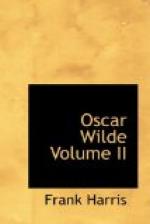The arrest of his development makes him a better representative of his time: he was an artistic expression of the best English mind: a Pagan and Epicurean, his rule of conduct was a selfish Individualism:—“Am I my brother’s keeper?” This attitude must entail a dreadful Nemesis, for it condemns one Briton in every four to a pauper’s grave. The result will convince the most hardened that such selfishness is not a creed by which human beings can live in society.
* * * * *
This summer of 1897 was the harvest time in Oscar Wilde’s Life; and his golden Indian summer. We owe it “De Profundis,” the best pages of prose he ever wrote, and “The Ballad of Reading Gaol,” his only original poem; yet one that will live as long as the language: we owe it also that sweet and charming letter to Bobbie Ross which shows him in his habit as he lived. I must still say a word or two about him in this summer in order to show the ordinary working of his mind.
On his release, and, indeed, for a year or two later, he called himself Sebastian Melmoth. But one had hardly spoken a half a dozen words to him, when he used to beg to be called Oscar Wilde. I remember how he pulled up someone who had just been introduced to him, who persisted in addressing him as Mr. Melmoth.
“Call me Oscar Wilde,” he pleaded, “Mr. Melmoth is unknown, you see.”
“I thought you preferred it,” said the stranger excusing himself.
“Oh, dear, no,” interrupted Oscar smiling, “I only use the name Melmoth to spare the blushes of the postman, to preserve his modesty,” and he laughed in the old delightful way.
It was always significant to me the eager delight with which he shuffled off the new name and took up the old one which he had made famous.
An anecdote from his life in the Chalet at this time showed that the old witty pagan in Oscar was not yet extinct.
An English lady who had written a great many novels and happened to be staying in Dieppe heard of him, and out of kindness or curiosity, or perhaps a mixture of both motives, wrote and invited him to luncheon. He accepted the invitation. The good lady did not know how to talk to Mr. Sebastian Melmoth, and time went heavily. At length she began to expatiate on the cheapness of things in France; did Mr. Melmoth know how wonderfully cheap and good the living was?
“Only fancy,” she went on, “you would not believe what that claret you are drinking costs.”
“Really?” questioned Oscar, with a polite smile.
“Of course I get it wholesale,” she explained, “but it only costs me sixpence a quart.”
“Oh, my dear lady, I’m afraid you have been cheated,” he exclaimed, “ladies should never buy wine. I’m afraid you have been sadly overcharged.”
The humour may excuse the discourtesy, but Oscar was so uniformly polite to everyone that the incident simply shows how ineffably he had been bored.




